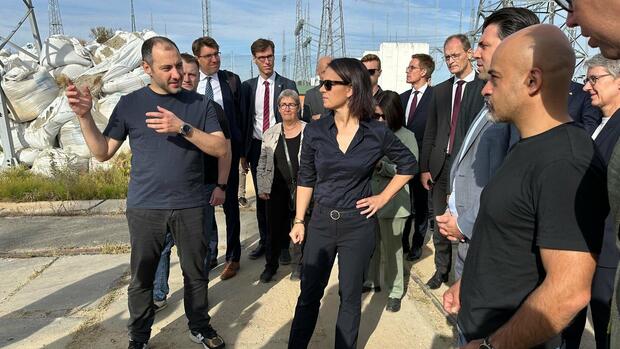Ukraine’s energy supply in particular suffered from Russia’s countless targeted attacks.
(Photo: dpa)
Berlin, Kyiv German Foreign Minister Annalena Baerbock (Greens) traveled to Kiev on Monday for the fourth time since the start of the Russian attack on Ukraine. The most important goal of the trip: to assure the country of German support.
“Ukraine is defending the freedom of all of us with enormous courage and determination,” said Baerbock upon her arrival in Kiev. “Just as Ukraine stands before us, it can also rely on us.”
The visit was kept secret in advance for security reasons. In the morning, Baerbock first visited the Makariw substation near Kiev together with the Deputy Prime Minister for the Reconstruction of Ukraine, Oleksandr Kubrakow. The main focus of the visit was on preparations for the upcoming winter.
Russia repeatedly attacks the energy infrastructure and thereby destabilizes the supply of Ukrainians. “We want to connect our energy network with Ukraine even more closely,” promised Baerbock.
The moral support provided by Baerbock’s visit comes at an important time for Ukraine, especially from a military perspective. With the Ukrainian counteroffensive progressing more slowly than many Western partner countries had hoped, there is growing concern in Ukraine about whether partner countries will maintain their military and financial aid to the country in the long term.
Europe supports Ukraine more than any other part of the world
Not only the USA, but especially Europe is playing an increasingly important role, as recent data shows. According to the “Ukraine Support Tracker” from the Kiel Institute for the World Economy (IfW), Europe has now overtaken the USA in promised aid for Ukraine.
The large support package that the EU announced in the summer is significant. Accordingly, benefits amounting to 50 billion euros should be provided between 2023 and 2027. There were also further commitments from individual EU member states, including Germany.
>> Read also here: The live blog about the Ukrainian war
Ukrainian politicians warn of a decline in support. President Volodymyr Zelensky said in an interview with Britain’s Economist over the weekend that cutting aid to Ukraine would only prolong the war. According to Zelensky, such a development would not only harm the economy, but also the country’s war efforts. “If you are not for Ukraine, you are for Russia, and if you are not for Russia, you are for Ukraine. And if partners do not help us, it means that they will help Russia win,” he said.
As with other trips to Ukraine, the trip was kept secret for security reasons.
(Photo: dpa)
On Monday, Ukraine reported new successes in its counteroffensive against Russian invading forces. The Ukrainian armed forces have recaptured additional areas on both the eastern and southern fronts, said Deputy Defense Minister Hanna Maljar.
>> Read also here: This is how Germany is starting a new battle tank alliance
The offensive is currently progressing “at a very steady pace,” according to US military official Mark Milley, chairman of the Joint Chiefs of Staff of the US Armed Forces. Milley said on Sunday that Ukraine still had about 30 to 45 days of good weather conditions before the weather was expected to worsen. However, the head of Ukrainian military intelligence, Kyrylo Budanov, told Reuters over the weekend that Ukraine wanted to continue the counteroffensive regardless of weather conditions.
Baerbock also wants to support EU accession negotiations
During her visit to Ukraine, Baerbock also assured Kiev of support in the EU accession negotiations. The country can rely on Germany to “resolutely support it on its way to the European Union,” said the Foreign Minister. The country has had the status of an EU accession candidate since last summer – but before it can actually join the community of states, it still has to implement a few reforms.
Baerbock therefore indirectly dampened the hope for rapid progress. Baerbock praised the results of the judicial reform and media legislation. However, there is still a “way to go” in implementing the anti-oligarch law and the fight against corruption.
In order to begin accession negotiations, Kiev must implement reforms in a total of seven areas. Ukraine’s Deputy Prime Minister for European Integration Olha Stefanishyna said in an interview earlier this month that Ukraine will be ready for EU membership in two years.
More: Ukraine’s slow offensive worries the West
